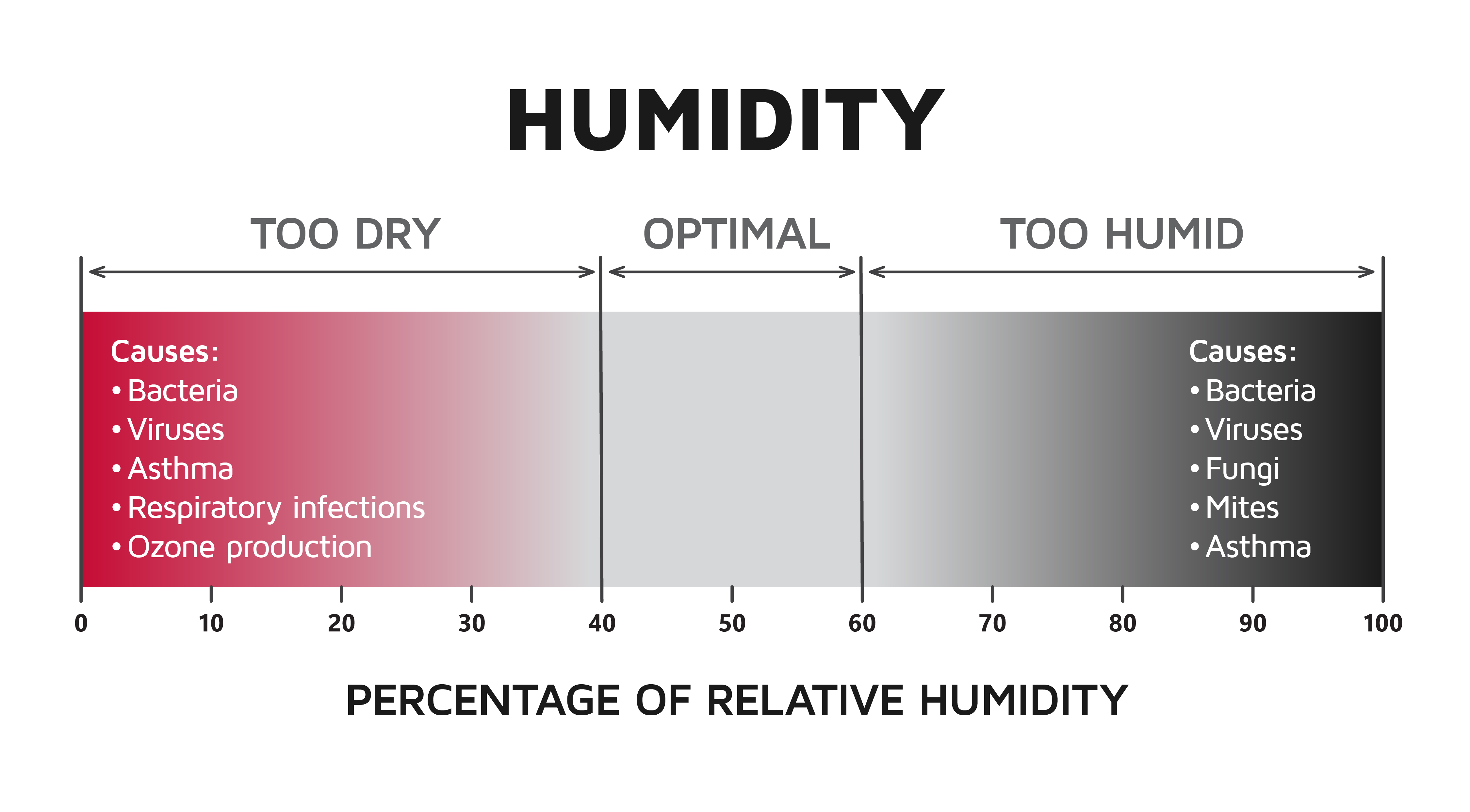One of the most critical impacts to your indoor comfort and health happens to be something most people don’t think about: indoor humidity levels. Whether you're dealing with the muggy days of summer or the dry chill of winter, the humidity in your home plays a huge role in ideal air quality in your home and how comfortable you feel. So, let’s dive into why it matters and how you can keep it just right.
Why Should You Care About Humidity?
Humidity refers to the amount of moisture present in the air in your home. When it’s too high or too low, it can cause a bunch of problems, from health issues to damage to your home. Here’s a quick rundown of why you should pay attention:
Health and Comfort
When the air in your home is too dry, it can lead to dry skin, irritated eyes, and respiratory problems. Ever wake up with a scratchy throat or chapped lips in the winter? That’s likely because your indoor air is too dry. However, if your home is too humid, it can feel stuffy and uncomfortable. High humidity can exacerbate allergies and asthma because it promotes the growth of mold, dust mites, and bacteria.
Home Maintenance
Excess humidity can damage your home. It can cause wood to warp, paint to peel, and walls to develop mold. Not to mention, it can make your home smell musty and unpleasant. When the air is too dry, it can cause wood floors, furniture and even musical instruments to crack and electronics to become static-y. It’s not just about comfort; it’s about protecting your home and everything in it.
How Can You Tell If Your Home’s Humidity Levels Are Off?
Here are some signs to watch out for:
Signs of Low Humidity
Respiratory Issues: When you breathe air containing too little moisture, mucus membranes lining the respiratory and nasal passages dry out. This can cause sore throats, nose bleeds, chest congestion and coughing, and worsen existing respiratory conditions.
Dry Skin and Irritated Eyes: If you and your family are constantly dealing with dry skin, itchy eyes, your home might be too dry.
Static Electricity: Do you get a little shock every time you touch a doorknob or your pet? That’s a sign of low humidity.
Cracks in Wood: Check your wooden furniture and floors. If they’re starting to crack or warp, low humidity could be the culprit.
Signs of High Humidity
Poor Sleep: According to the National Sleep Foundation, high humidity can increase wakefulness and reduce the amount of time you spend in both slow-wave NREM and REM sleep, causing issues related to bodily recovery and memory consolidation.
Condensation on Windows: If you notice water droplets on the inside of your windows, it’s a sign that there’s too much moisture in the air.
Mold Spots: Mold loves damp environments. If you’re spotting mold in corners, on walls, or in the bathroom, your home’s humidity is too high.
Musty Smells: A persistent musty smell is a dead giveaway that there’s too much moisture in your home.

Ideally, you want to keep your home’s humidity between 40% and 60%. Both the WHO (World Health Organization) and EPA (Environmental Protection Agency) recommend this range as it is generally comfortable for most people, and helps to prevent the problems you and your home may face with humidity levels outside of this range.
How to Control Humidity Levels
Let’s talk solutions. How can you maintain that perfect humidity balance in your home? Here are some tips:
For Low Humidity
Use a Humidifier: These handy devices add moisture to the air. They’re especially useful in the winter when indoor air tends to be drier.
Houseplants: Adding some greenery to your home can help increase humidity levels naturally.
Utilize Water Sources: Using indoor water fountains or placing bowls of water near heating sources can help add moisture to the air as the water evaporates.
For High Humidity
Use a Dehumidifier: These devices remove excess moisture from the air. They’re perfect for basements or other damp areas of your home.
Ventilation: Make sure your home is well-ventilated. Use exhaust fans in the kitchen and bathroom, and open windows when the weather allows.
Fix Leaks: Check for any leaks around windows, doors, and pipes. Fixing these can prevent excess moisture from entering your home.
At Lennox, we offer a range of high-quality humidifiers and dehumidifiers that are designed to improve your indoor air quality and maintain ideal humidity levels. Our products are built with advanced technology and energy-efficient features to provide you with the best possible experience.
Remember, maintaining an ideal indoor humidity level is essential for your comfort and well-being. By following these methods and tips, you can create a healthy indoor environment for you and your family.
Preventing Indoor Humidity Issues
Proper ventilation and air circulation
Good air circulation helps to remove excess moisture from your home. Make sure your home is well-ventilated by opening windows and using exhaust fans in areas prone to moisture, such as the kitchen and bathroom. Additionally, consider investing in a whole-house ventilation system, like the Lennox Healthy Climate Ventilation System, which helps to bring in fresh air while removing stale air.
Insulation Techniques to control humidity.
Insulation plays a crucial role in maintaining optimal humidity levels. Proper insulation helps to prevent moisture from entering your home from outside and keeps conditioned air from escaping. Ensure that your home is properly insulated by sealing gaps and cracks, adding insulation to attics and crawl spaces, and using vapor barriers where necessary.
Regular HVAC Maintenance to ensure humidity control
Your HVAC system plays a significant role in maintaining indoor humidity levels. Regular maintenance, including cleaning or replacing filters, checking for leaks, and ensuring proper airflow, is essential. Consider upgrading to a high-efficiency HVAC system or adding an indoor air quality unit, like the Lennox Whole-Home Dehumidifier, to your current system to remove excess moisture from the air.
By implementing these strategies, you can effectively prevent indoor humidity issues and create a more comfortable and healthier living environment. Remember, for optimal results, it's important to consult with a professional HVAC technician who can assess your specific needs and provide personalized recommendations.
Keeping an eye on your home’s humidity levels might not be the most glamorous part of home maintenance, but it’s definitely one of the most important. By maintaining the right balance, you’ll keep your home comfortable, protect your belongings, and safeguard your health. So, go ahead and check those humidity levels – your home (and your health) will thank you!

